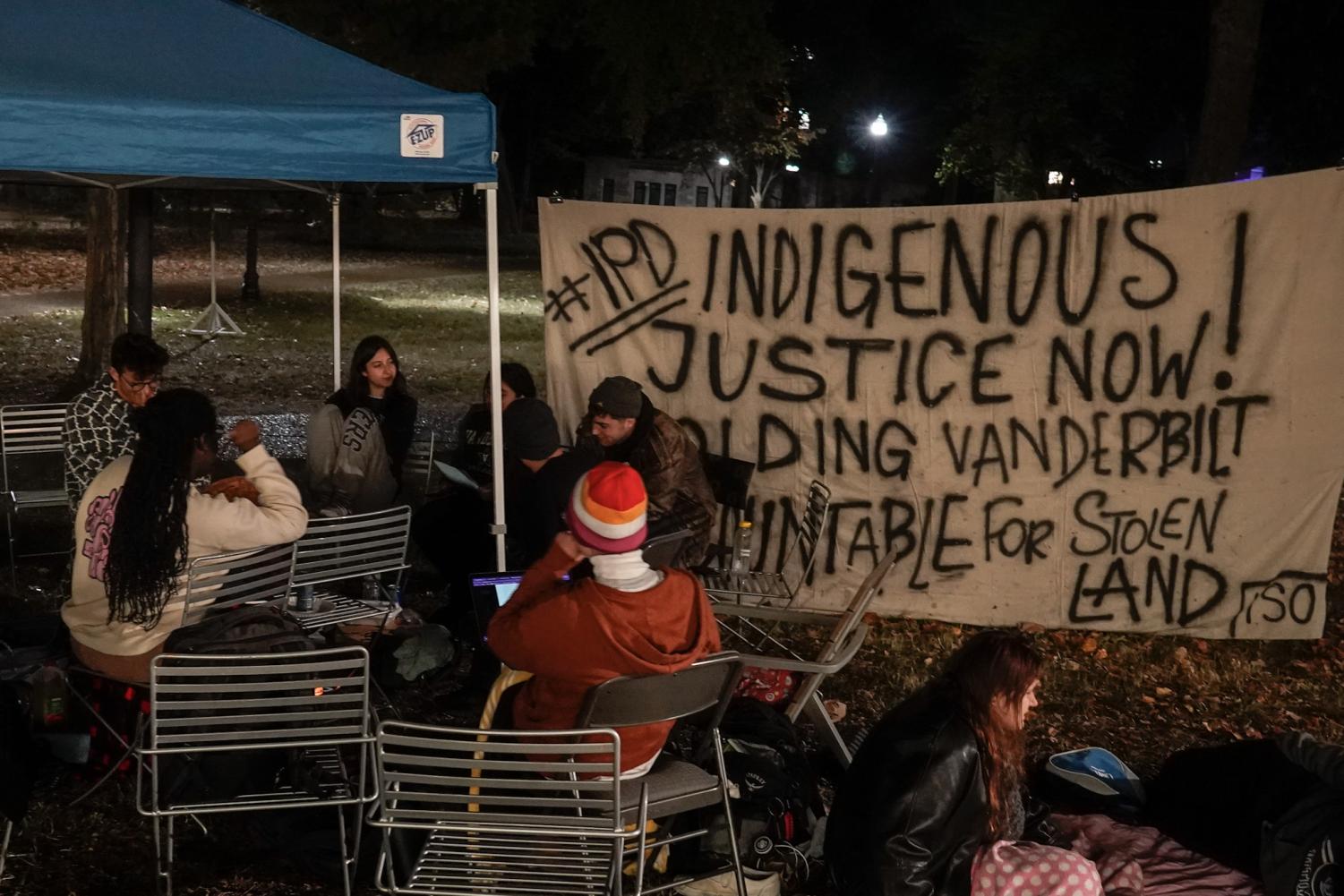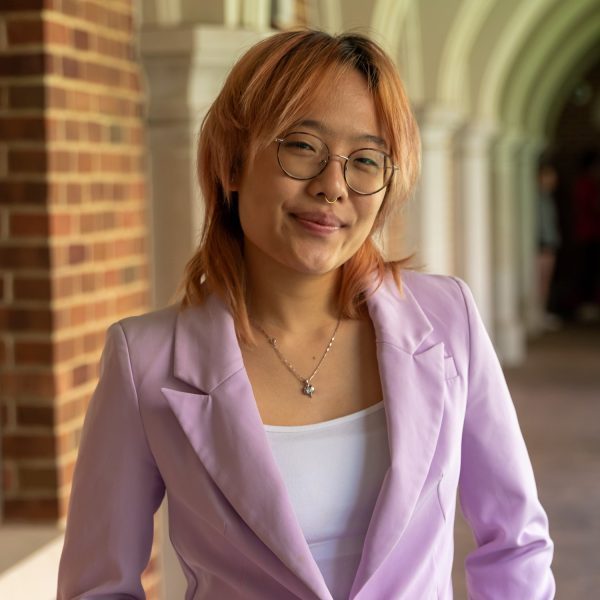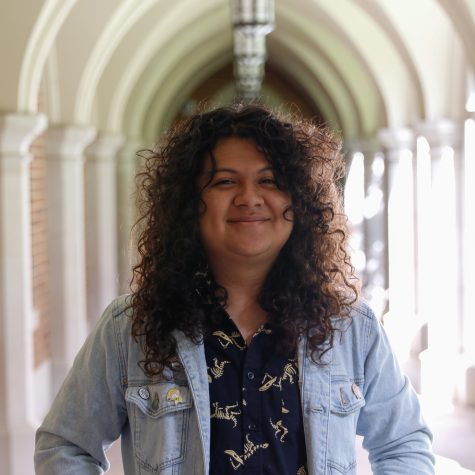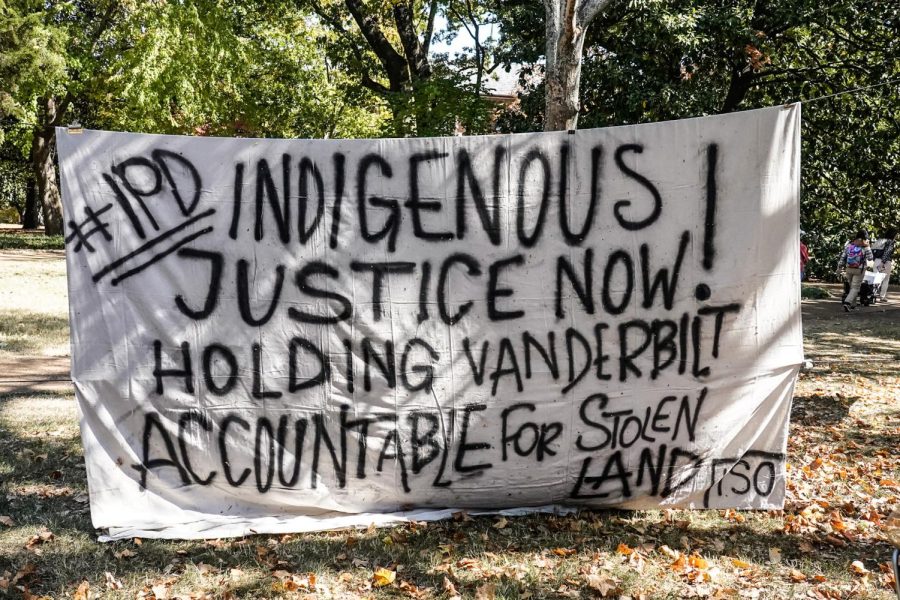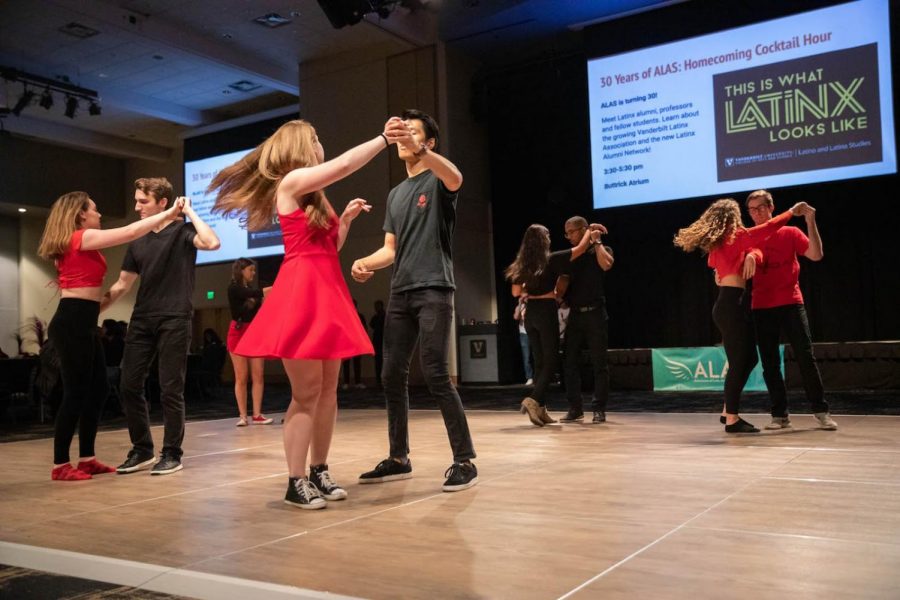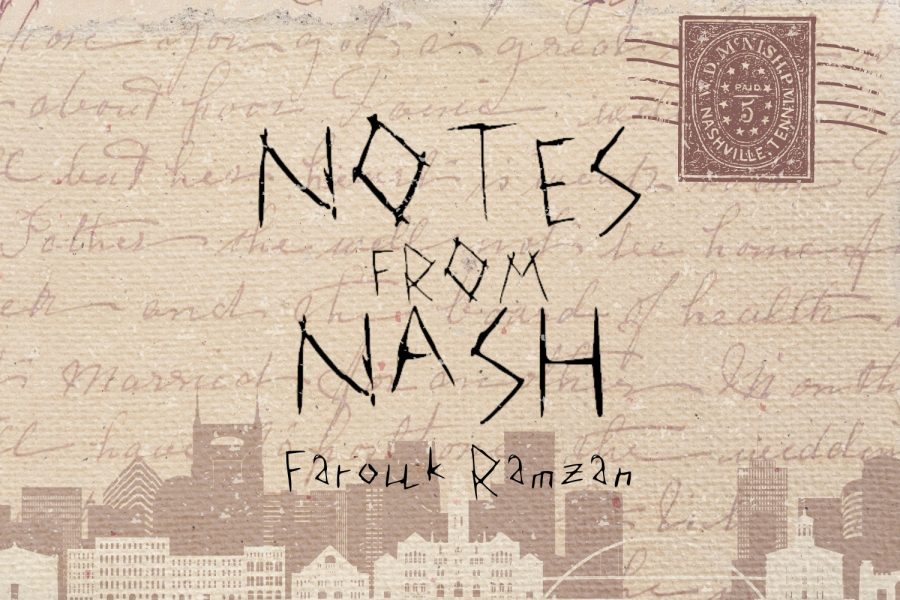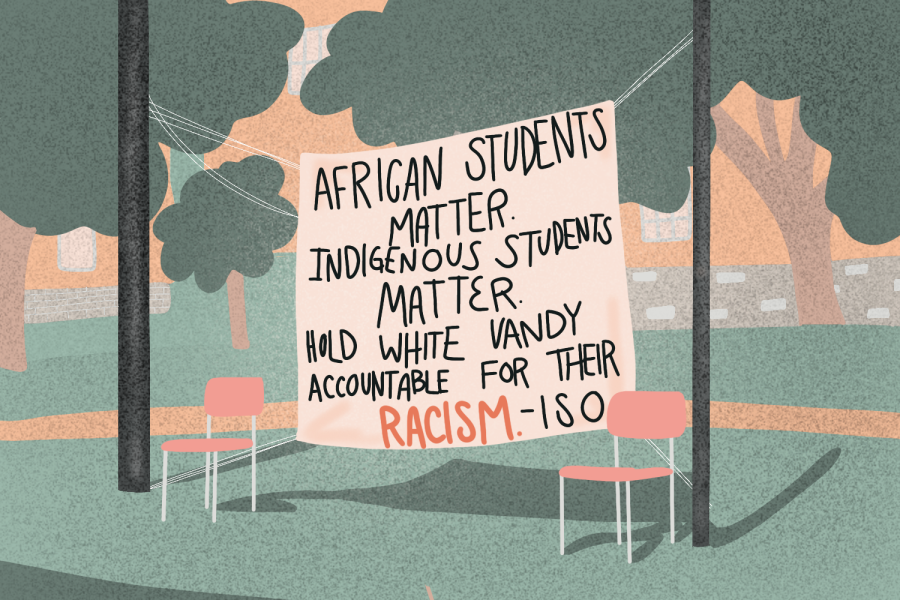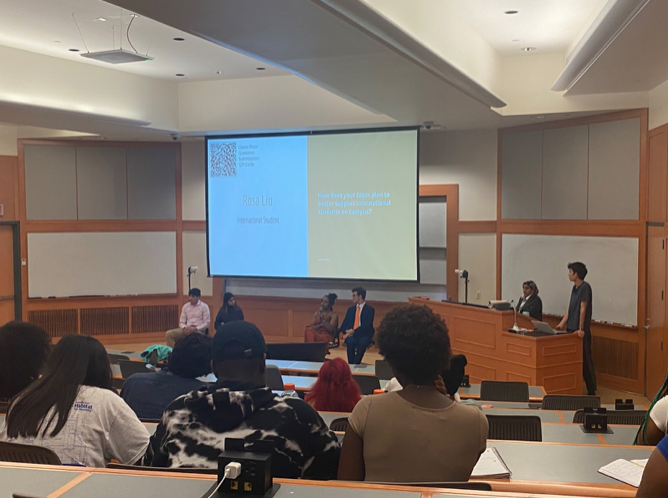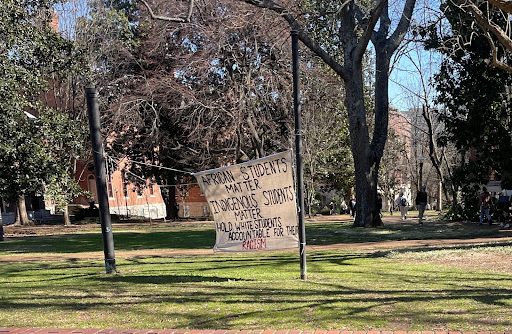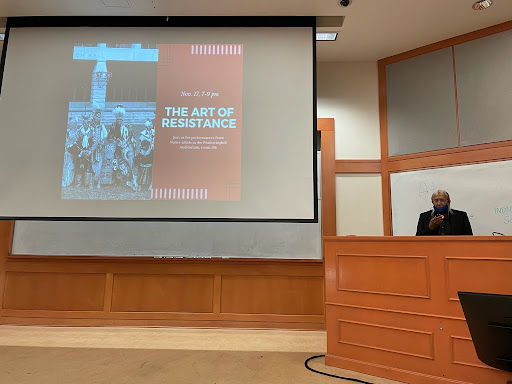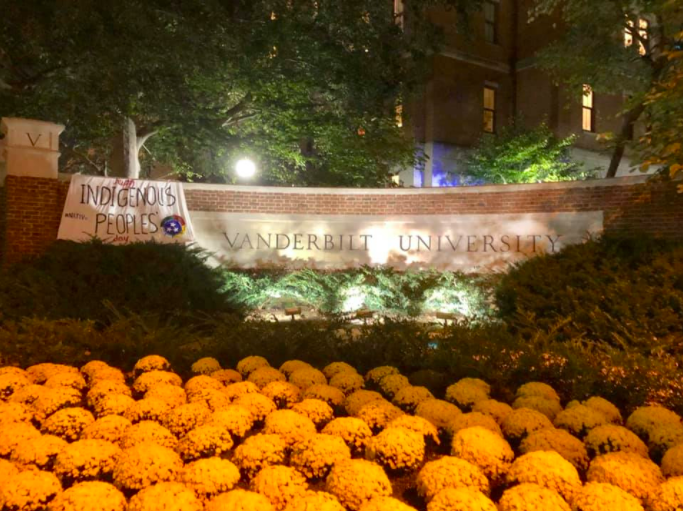Over 20 students from the Indigenous Scholars Organization staged a 24-hour long protest outside of Rand Dining Hall to raise attention to issues faced by Indigenous students, to commemorate Indigenous People’s Day and to advocate for an official university land acknowledgment. A university representative stated in an Oct. 11 message to The Hustler that Vanderbilt does not currently plan to adopt a land acknowledgment.
Protestors hung a banner reading, “Indigenous Justice Now! Hold Vanderbilt Accountable for Stolen Land.” The demonstration started at 12:30 p.m. CDT on Oct. 10 and ended at 12:30 p.m. CDT the next day.
During the protest, ISO circulated a Indigenous People’s Day Coalition Statement and petition via email to five administrators including Chancellor Daniel Diermier, Dean of Ingram Commons Melissa Gresalfi and Dean of Students G.L. Black. Per ISO co-president and second-year graduate student Dante Reyna, ISO has not received a response to their petition as of print.
The statement details six demands from ISO to the university, the first of which is for the university to pass a land acknowledgment. In an Oct. 11 statement to The Hustler, the university stated that it would not endorse an official land acknowledgment due to “legal implications,” but did not respond to The Hustler’s inquiry about specific concerns.
“Vanderbilt community members who make land acknowledgments do not speak for the university,” the university statement reads.
Indigenous People’s Day Coalition Statement
As of print, 221 students, alumni and community members have signed ISO’s statement and petition. Per Reyna, ISO has advocated for the university to adopt a land acknowledgment for nearly four years.
“A land acknowledgment is simply the bare minimum that the university can do to address Indigenous issues,” Reyna said. “In addition to that, the quality of life, and especially the quality of student life, is substantially worse for Indigenous people.”
In September 2019, VSG passed the Indigenous People’s Day and Land Recognition Bill, affirming its support of the university adopting a land acknowledgment and reading it at major school events. A resolution asking the university to adopt a land acknowledgment—which was written by ISO—was brought forward to the Faculty Senate in January 2021. The Senate voted to recommit it to its Diversity, Equity and Inclusion committee.
“The Faculty Senate, through its committee structure, continues to consider issues of importance to the faculty in the shared governance model in which we participate,” current Faculty Senate Chair Rebecca Swan said in an Oct. 13 message to The Hustler.
The second demand listed on the petition asks the university to create a designated space on campus for Indigenous students to “gather, celebrate and rest.” Reyna pointed to the small percentage of Native American students—0.4% of the campus population—as a reason for a campus center.
“Indigenous people flourish in their own spaces,” Reyna said. “An Indigenous space would provide us an avenue in order to feel like ourselves and for us to practice our traditions and ceremonies in a safe place.”
Other demands include for the university to establish an Indigenous Studies major and minor led by Indigenous faculty and to create an orientation program educating incoming undergraduates about the history and current issues faced by Native Americans in Tennessee. ISO added that the university should “make space” for more on-campus leadership opportunities for Indigenous students and faculty.
The petition also calls for the university to enforce rules preventing non-Indigenous faculty from “keeping and maligning” Indigenous artifacts. In 2007, a then-graduate student filed a lawsuit against anthropology professor Arthur Demarest, in part accusing him of “destruction of artifacts” while on a dig site in Guatemala. The parties reached a confidential settlement in 2008. Demarest told The Hustler that the lawsuit’s accusations are false, and all of the artifacts that he owns are replicas or gifts given to him by Indigenous communities.
Department of Anthropology Chair Beth Conklin stated in a message to The Hustler that the department, which houses a substantial amount of Indigenous artifacts at Vanderbilt, “has a deep commitment to ethical stewardship of Native American ancestral remains and belongings housed on campus.” Per Conklin, the department repatriated ancestral remains to the Chickasaw Nation in 2019 and is housing remaining Native American ancestral remains and belongings in “locked locations out of sight” as it continues the repatriation process.
“We are in the early stages of reimagining new and innovative approaches to supporting all Vanderbilt community members’ identities with the goal of strengthening a sense of belonging for everyone at the university,” the university stated in its Oct. 11 message to The Hustler. “We will be working through this process in close collaboration with Vanderbilt Student Government and the Faculty Senate beginning later this fall.”
Protest
During the protest, a group of approximately 20 ISO members and student volunteers took shifts guarding the banner that they had hung outside of Rand. Six students stayed outside throughout the night.
People aren’t listening to us, so we’re taking alternative steps to make sure that our community is recognized and has power within these processes.
— Annabelle Littlejohn-Bailey
Sophomore Shalini Thinakaran, who took part in the demonstration, called it an “homage” to a similar protest organized by ISO and the African Student Union last year in March. In response to a Chabad speaker event, ISO and ASU hung a banner outside Rand, which was taken down by Black due to it not being attributed to a student organization. Organizers then put up another banner and guarded it overnight.
Per ISO co-president and junior Annabelle Littlejohn-Bailey, the organizers hoped to place pressure on the university to generate broader support for ISO’s demands. Littlejohn-Bailey is a staff writer for The Hustler.
“We want to push for an Indigenous community that has a voice and feels that it can go through the normal process of appealing to our administration and appealing to professors, but we feel that all of those normal processes so far have led us to nothing,” Littlejohn-Bailey said. “People aren’t listening to us, so we’re taking alternative steps to make sure that our community is recognized and has power within these processes.”
The Indigenous People’s Day protest concluded with a speech by Reyna to a group of gathered student organizers and onlookers.
“It is our job to shed light on the history that came before us and for all those whose light was extinguished,” Reyna said. “We are eternal visitors to this land and must work with indigenous people to illuminate the way for those lost and, more importantly, make sure that what was lost is never lost again.”



